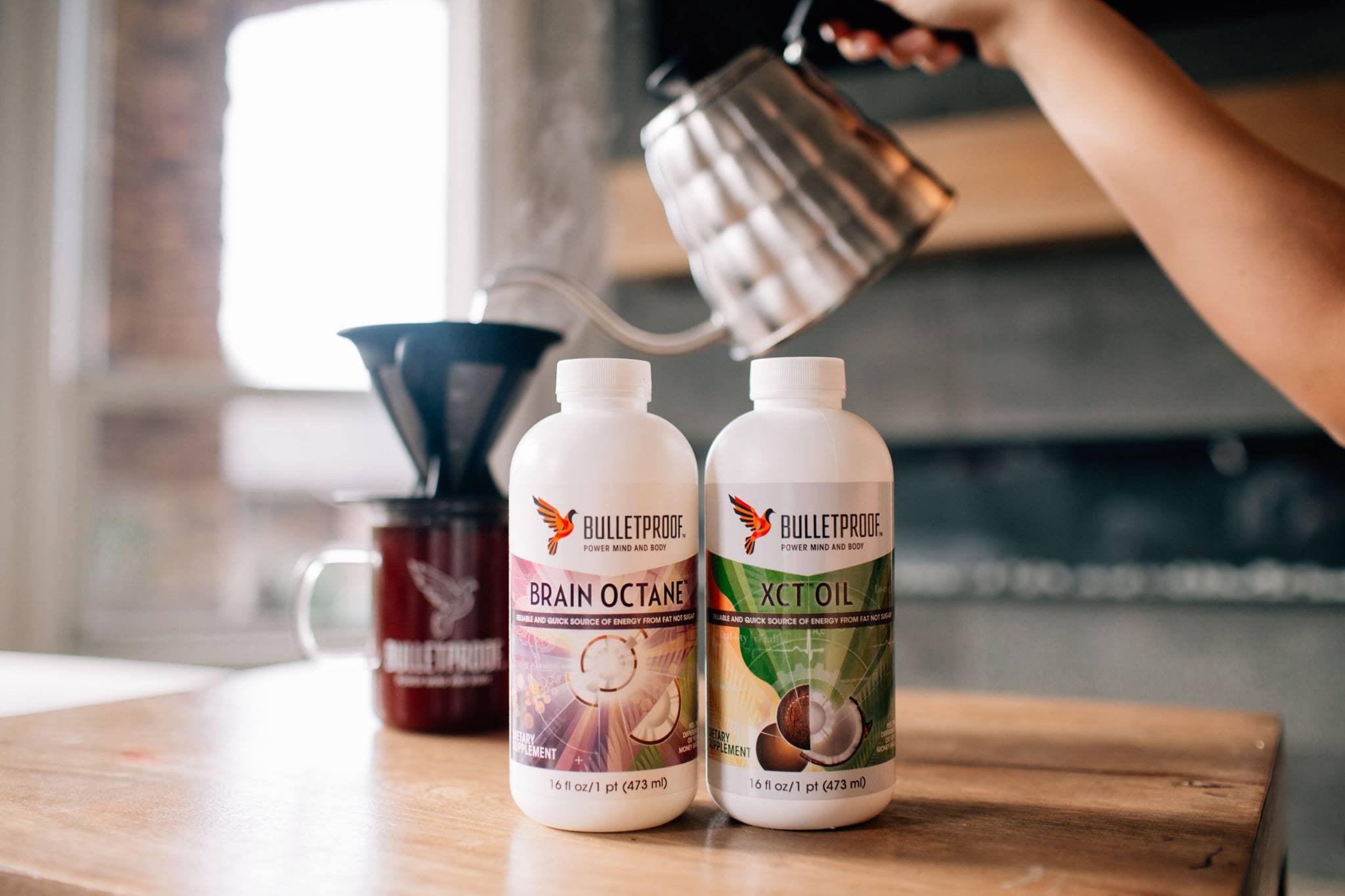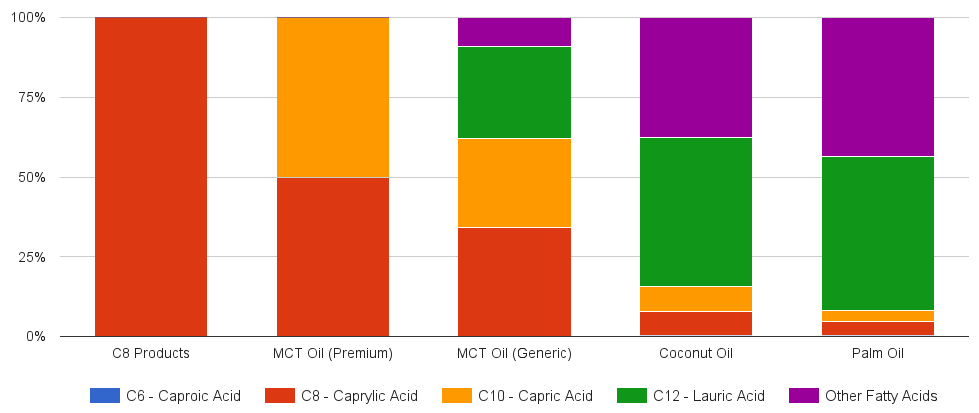
Everyday modern life require person to be up to speed with high volume information flows that often cause overload, exhaustion, mental fatigue or even stress and burnout in long term. In order to minimise these risks, you body, particular brain, require high potent fuel to deal with cognitive challenges.
And one of the best solution for it, is the Bulletproof Brain Octane Oil, currently the purest and finest Caprylic fatty acid (C8) on the market. Production done in triple steam distillation process in a non-oxygen atmosphere to avoid lipid oxidation, completely chemical and solvent-free way.
You can add Bulletproof Brain Octane oil in your morning coffee, protein cocktails, salad dressing, drinkable meals or any other food there you regularly add vegetable oils. It is suitable to cook under 160 C (320 F) temperature.
So why is the Bulletproof Brain Octane oil are good for you..?
Easy and fast metabolism by brain and nervous tissue (compete with glucosa). Almost 70-85% of human brain (dry mass) consist of the different fats (lipids like, cholesterol, palmitic, stearic, oleic acids) and the rest proteins. In contrast, with other body cells there most biological membranes have a higher ratio of proteins to fats.
While glucose works only as fuel source, Brain Octane oil body play double function - as fuel and as a construction material for brain's lipids (fats).
In contrast to glucose, Brain Octane oil bypass cytoplasmic glycolysis and directly enter the mitochondria where they are metabolized.
The amount of energy (acetyl-CoA) formed from Brain Octane oil metabolism is greater than formed from glucose metabolism.
Brain Octane oil is especially beneficial supplement for fueling physical exertion, given their high energy density content, rapid rate of absorption and quick metabolic conversion into cellular energy.
Brain Octane oil can be quickly mobilized in the post-exercise recovery phase to rebuild muscles and prevent the breakdown of proteins (catabolism) that can occur when the body is putting a maximum demand on the body’s energy reserves.
Brain Octane oil also has strong antibacterial, antiviral, and antifungal activities on gut microbiota.
It is effective at improving blood lipid profiles like good cholesterol, HDL.
Brain Octane oil helps reestablish and maintain normal brain function, stimulate healing in those affected by conditions like Alzheimer’s, Parkinson’s, Autism, Epilepsy, MS, ALS, Dementia. Ketone bodies from Brain Octane oil provide a much needed alternative fuel source to glucose that can recharge metabolic processes within the brain, resulting in an almost immediate improvement in cognitive function.
Brain Octane Oil - caprylic Acid (C8) vs other MCT oil products
Brain Octane oil (Caprylic acid, C8) is essentially a refined version of MCT oils that have had the capric acid (C10) and lauric acid (C12) filtered out, leaving only caprylic acid (C8) as the fatty acid component. And majority study done about MCT oil health benefit derived solely from caprylic acid (C8) properties.
Different types of MCT oils

MCTs have proven useful in treating a number of medical disorders that involve impaired or damaged lipid (fat) metabolism. These include: obstructive jaundice, biliary cirrhosis, pancreatitis, cystic fibrosis, celiac disease, Whipple’s disease, Crohn’s disease, regional enteritis, and malabsorption in neonates.
MCT has been reported to be useful for feeding of newborn infants, to both assist their initial growth and to contribute to their physiological development. The absorption of calcium and magnesium appears to be enhanced when the diet contains MCTs, particularly in infants, and the absorption of amino acids also appears to be improved. Thus, MCTs can be a useful addition to the diet of those suffering from any form of malnutrition or tissue wasting. In this regard, MCTs are often added to parenteral formulas for intravenous feeding following surgery or during recovery from severe injuries, burns and infections.
Study and references:
- McGarry, J. D., & Foster, D. W. (1971). The Regulation of Ketogenesis from Octanoic Acid THE ROLE OF THE TRICARBOXYLIC ACID CYCLE AND FATTY ACID SYNTHESIS. Journal of Biological Chemistry, 246(4), 1149-1159.
- Miles, J. M., Haymond, M. W., Nissen, S. L., & Gerich, J. E. (1983). Effects of free fatty acid availability, glucagon excess, and insulin deficiency on ketone body production in postabsorptive man. Journal of Clinical Investigation, 71(6), 1554.
- Schwabe, A. D., Bennett, L. R., & Bowman, L. P. (1964). Octanoic acid absorption and oxidation in humans. Journal of applied physiology, 19(2), 335-337.
- Nair, M. K. M., Joy, J., Vasudevan, P., Hinckley, L., Hoagland, T. A., & Venkitanarayanan, K. S. (2005). Antibacterial effect of caprylic acid and monocaprylin on major bacterial mastitis pathogens. Journal of dairy science, 88(10), 3488-3495.
- Kim, B. H., Sandock, K. D., Robertson, T. P., Lewis, S. J., & Akoh, C. C. (2008). Dietary structured lipids and phytosteryl esters: blood lipids and cardiovascular status in spontaneously hypertensive rats. Lipids, 43(1), 55-64.
- Scalfi, L., Coltorti, A., & Contaldo, F. (1991). Postprandial thermogenesis in lean and obese subjects after meals supplemented with medium-chain and long-chain triglycerides. The American journal of clinical nutrition, 53(5), 1130-1133.